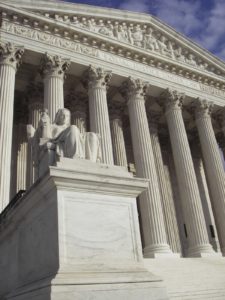In his 12 years as a justice on the U.S. Court of Appeals for the D.C. Circuit, Brett Kavanaugh has been a prolific author, writing nearly 300 opinions, including a handful addressing the legality of major EPA regulations. These writings have generally indicated Kavanaugh’s skepticism about EPA actions that do not strictly adhere to the language of federal environmental statutes. While these decisions have been specific to individual EPA actions, commentators on Kavanaugh’s nomination to the U.S. Supreme Court have also pointed to several statements by the judge not contained in opinions, which may provide a more general sense of the direction Kavanaugh might take on environmental cases should he clear the Senate and be seated on the high court.
Separation of Powers
The first statement was made during oral arguments in West Virginia v. EPA, a case in which states challenged EPA’s Clean Power Plan to regulate greenhouse gas emissions from fossil fuel power plants. In somewhat of a departure from statements about climate change made by President George W. Bush and EPA ex-Administrator Scott Pruitt, Kavanaugh did not express skepticism about human influence on the climate. However, he was concerned about Congress’s noninvolvement in establishing governing law. Kavanaugh stated:
“I just want to say, on the policy I understand, and the Earth is warming, and humans are contributing, and I understand the international collective action problem here, I understand that very well, and I understand the frustration with Congress, I live that, too, everyone understands that. But under our system of separation of powers, and this is why it’s so important that we maintain that, Congress is supposed to make the decision. You might say, you know, this Congress is not going to, they’re not going to do anything, but that’s not how we get to make decisions.”
In other words, while Kavanaugh seems to recognize that the dangers of a changing climate can be mitigated through human intervention, his major concern as a jurist is that any decision on how to address the matter is in the hands of Congress, not any agency of the executive branch, and Congress has simply not passed legislation to address the risks of climate change.
“Here he sounds much like the late justice Antonin Scalia, speaking for the majority in the 2014 case Utility Air Regulatory Group v. EPA,” wrote Patrick J. Michaels and Trevor Burrus of the CatoInstitute, who quoted Scalia: “When an agency claims to discover in a long-extant statute an unheralded power to regulate ‘a significant portion of the American economy’ we [the Court] typically greet its announcement with a measure of skepticism. We expect Congress to speak clearly if it wishes to assign to an agency decisions of vast ‘economic and political significance.’”

Kavanaugh on Chevron
A second clue about how Kavanaugh’s judicial philosophy might manifest itself in environmental cases might be found in his 46-page review of the book Judging Statutes by Robert A. Katzmann (Harvard Law Review). Kavanaugh writes in some detail about the Chevron Deference. Established by the U.S. Supreme Court in a 1984 opinion (Chevron USA v. NRDC), this precedent acknowledged that federal agencies have considerable latitude to interpret a statute through rulemaking when Congress has not directly addressed the matter or did so in an ambiguous manner. The Chevron Deference has been invoked many times by the D.C. Circuit and other courts that refused to rule against the EPA when the Agency displayed considerable legal flexibility in promulgating regulations generally opposed by industry. In his review, Kavanaugh questions the legal foundation of the Deference.
“Under Chevron, courts uphold an agency’s reading of a statute—even if not the best reading—so long as the statute is ambiguous and the agency’s reading is at least reasonable. This statutory interpretation principle is probably the one I encounter most as a judge on the D.C. Circuit. Chevron has been criticized for many reasons. To begin with, it has no basis in the Administrative Procedure Act. So Chevron itself is an atextual invention by courts. In many ways, Chevron is nothing more than a judicially orchestrated shift of power from Congress to the Executive Branch.
“From my more than five years of experience at the White House, I can confidently say that Chevron encourages the Executive Branch (whichever party controls it) to be extremely aggressive in seeking to squeeze its policy goals into ill-fitting statutory authorizations and restraints.”
In his obvious resistance to the Chevron Deference and the many pro-EPA rulings it has led to, Kavanaugh is much in the same mold as Supreme Court Justice Neil Gorsuch; see Gorsuch’s opinion in (Hugo Rosaria Gutierrea-Brizuela v. Loretta E. Lynch).
Can Conclusions Be Drawn?
Probably not about any individual case. But Kavanaugh’s obvious distaste for Executive Agency actions that veer outside the margins of federal law suggest a strict constructionist who will not endorse any EPA action that is not explicitly—or very close to explicitly—authorized in the environmental statutes.

